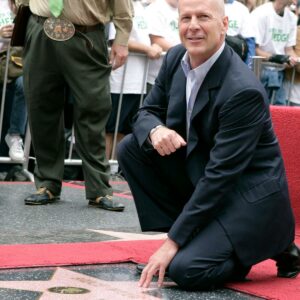It was the moment fans had been waiting for, a rare and intimate glimpse into the life of a man who had been both celebrated and scrutinized on a global scale. In his first live interview in over 14 years, Michael Jackson broke his long-held silence, offering viewers an unprecedented look into his world—the triumphs, the challenges, and the profound personal revelations of one of music’s greatest icons.
For years, Michael Jackson had largely remained a mystery, shying away from the media spotlight that seemed to chase his every move. But this interview was different. He sat down with a calm yet resolute demeanor, eager to tell his story in his own words. It was as if he were peeling back layers, sharing pieces of his life that few had ever seen or understood.
Personal Revelations: A Peek into Jackson’s Childhood and Family Life
Perhaps the most poignant part of the interview was Jackson’s reflection on his childhood, a time marked by both remarkable talent and tremendous sacrifice. “I grew up too fast,” he admitted, his voice tinged with a mixture of nostalgia and melancholy. Michael, who started performing professionally at just five years old, shared that while he loved music and dancing, his early years came at a price. The relentless schedule, the constant need for perfection, and the intense spotlight often left him feeling isolated and emotionally stunted.
Jackson also spoke candidly about his relationship with his father, Joseph, who had been a complex figure in his life. Known for his strict discipline and unwavering determination to push his children toward success, Joseph’s parenting had a profound impact on young Michael. “He was hard on us, and sometimes it hurt,” Jackson acknowledged, pausing to collect himself. “But I know he loved us, and he believed in us.” Yet, he hinted at an enduring emotional struggle, suggesting that the scars from those formative years had never entirely healed.
The Jackson family dynamic was, by all accounts, intense and tightly knit, and Michael’s sense of responsibility toward his siblings was evident. He spoke lovingly of his brothers and sisters, recalling both the laughter and the challenges they shared as they rose to fame together. “We were a team,” he said, a soft smile breaking through. “When we performed, it was like magic. But there was always a part of me that longed for something different, something…normal.”
Addressing Controversies: Dispelling Myths and Confirming Truths
Over the years, Jackson had been the subject of countless rumors and tabloid stories. His appearance, his skin color, and his health were endlessly dissected, leaving fans and critics alike speculating about the truth behind the headlines. In a bold move, Jackson used this interview to address these topics head-on, determined to set the record straight once and for all.
One of the most persistent rumors had been about his changing skin color. Jackson revealed that he suffered from vitiligo, a skin condition that causes depigmentation in patches. “It’s something I’ve had to live with, and it’s been challenging,” he admitted. The disease had not only impacted his physical appearance but also subjected him to unwarranted scrutiny and judgment. “People thought I was trying to change who I was, but it was never like that,” he explained, his voice steady but somber. “I just wanted to be accepted.”
Jackson also addressed his health more broadly, acknowledging that the pressures of his career had taken a toll. Despite his dazzling performances and seemingly boundless energy on stage, he admitted that his physical and mental well-being had been compromised by years of stress and public pressure. “People don’t see what happens behind the scenes,” he said softly. “They see the shows, the lights, but they don’t see the toll it takes.”
The interview also touched on other controversies, ones that Jackson had long avoided discussing. Although he kept his responses measured, he made it clear that much of the speculation surrounding him was rooted in misunderstanding and sensationalism. “I’m human, just like everyone else,” he reminded the audience. “I have feelings, fears, hopes, and dreams. Sometimes, people forget that.”
Passion for Music and Art: The Driving Force of His Life
When the conversation shifted to music, Jackson’s entire demeanor seemed to lighten. His eyes sparkled with the enthusiasm of someone truly passionate about their craft. “Music is everything to me,” he shared, a smile spreading across his face. “It’s the way I connect with the world, the way I express things I can’t put into words.”
Jackson described his creative process, emphasizing how he poured his emotions and experiences into his work. For him, music wasn’t just a profession—it was a lifeline, a way to communicate with his fans on a deeply personal level. He recounted how certain songs, like “Man in the Mirror” and “Earth Song,” were born out of a profound desire to inspire change and bring people together. “I believe music can heal, it can unite,” he said passionately. “And I want to be part of that.”
Despite the intensity of his fame, Jackson seemed most at home in the studio or on stage, where he could escape the pressures of reality and lose himself in his art. He spoke of his iconic performances, the joy he felt when the music and choreography came together flawlessly, and the indescribable connection he felt with his audience. “When I’m performing, it’s like everything else fades away,” he mused. “It’s just me and the music.”
Insights into His Philanthropy: A Heart for Humanity
While his music had undoubtedly shaped his legacy, Jackson was equally committed to his humanitarian efforts, a facet of his life that he rarely spoke about publicly. In this interview, however, he opened up about his motivations for giving back, revealing a side of himself that was both compassionate and deeply empathetic.
“I feel a responsibility to use what I’ve been given to help others,” he explained. Over the years, Jackson had quietly supported numerous charities and causes, from hospitals to orphanages to environmental initiatives. For him, philanthropy was more than just a duty—it was a calling. He recounted visiting hospitals, meeting children who were ill, and witnessing firsthand the impact of even the smallest acts of kindness. “Sometimes, a smile, a touch, a song—it can make all the difference,” he said, his voice filled with emotion.
Jackson’s philanthropy wasn’t limited to financial contributions; he often used his music to raise awareness about issues he cared deeply about. Songs like “We Are the World” and “Heal the World” were powerful calls to action, urging listeners to come together and make a difference. “I want my music to be more than entertainment,” he said. “I want it to inspire people, to remind them of the good we’re all capable of.”
A Glimpse Behind the Fame: The Price of Being Michael Jackson
As the interview neared its conclusion, Jackson offered a candid perspective on the loneliness of fame, a theme that resonated deeply with many viewers. Despite his extraordinary success, he admitted that life in the spotlight could be isolating. “There are days when it feels like I’m living in a bubble,” he confessed. “It’s hard to know who you can trust, who sees you for who you really are.”
Jackson spoke about the double-edged nature of fame—the adoration of fans, the exhilaration of performing, but also the scrutiny, the rumors, and the relentless pressure to maintain an image. He described the surreal experience of walking into a room and feeling the eyes of the world upon him, each gaze filled with expectation. “People see what they want to see,” he reflected. “But there’s a part of me that’s just…Michael.”
In a vulnerable moment, he admitted that the relentless attention sometimes left him feeling disconnected from himself. “There are days when I wish I could just disappear, be someone else, even just for a little while,” he revealed. “But I know that my music, my life—it means something to people, and that keeps me going.”
The interview ended on a hopeful note, with Jackson expressing his gratitude for his fans and the love they had shown him throughout his career. “I’m here because of them,” he said sincerely. “They’ve given me everything, and I’ll always be thankful.”
Conclusion: A Human Behind the Legend
For many viewers, this interview was a revelation—a chance to see Michael Jackson not as the “King of Pop,” but as a person, with all the complexities, struggles, and triumphs that come with that. He was vulnerable, introspective, and refreshingly honest, peeling back the layers of his public persona to reveal the man beneath the legend.
In a world that often sought to define him by headlines and rumors, Jackson used this rare opportunity to share his truth. It was a powerful reminder that, behind the fame, the music, and the controversies, he was just a man—a man who loved, who hurt, and who ultimately sought to make the world a little better through his art. And in those moments, he succeeded in connecting with his audience in the most profound way possible: by simply being himself.





